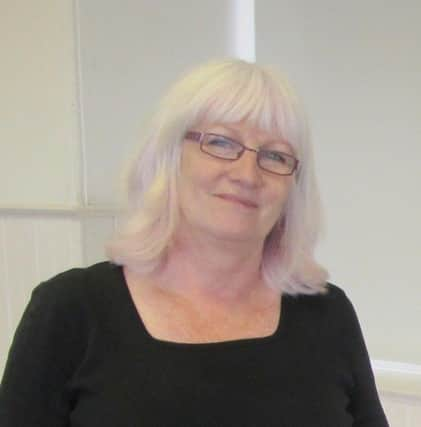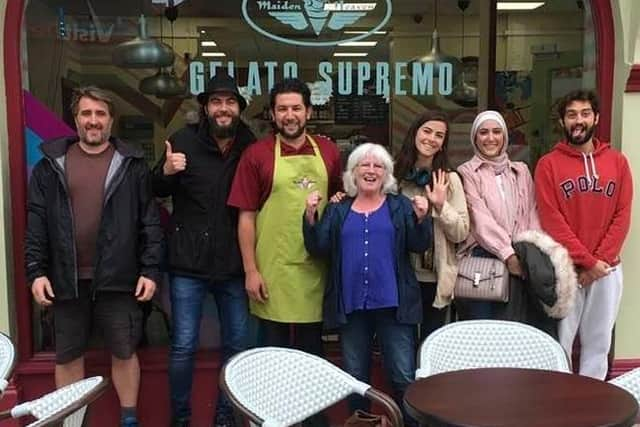Derry shop inspires a new play linking Irish and Arabic cultures


The play was written and directed by Patricia Byrne, who explores the link between Irish and Arabic cultures.
Byrne achieves a great sense of sadness, humour and resilience in her writing. The similarities Patricia has identified between these two cultures is profound.
Advertisement
Hide AdAdvertisement
Hide AdThe connection between the language, the history, the music and relationship to the land echoes throughout each scene.


The play is presented by Sole Purpose Productions who will mark their 25th year in 2022. They say that this is a “celebration and acknowledgment of two very similar, but different, human experiences”.
The essence of the story is inspired by local businessman, and native of Egypt, Mohamed Ali. He was the Manager of Samara’s Shop, a convenience store situated directly across from the Guildhall Square.
At that time, it was a sanctuary of comfort for individuals escaping countries such as Libya, Syria, Lebanon and Iraq. Patricia says she wanted to write a play which “represents” refugees in a positive way.
Advertisement
Hide AdAdvertisement
Hide Ad“Syrian people were coming to Derry in 2016 and I wanted to create a piece of theatre that they would like, relate to and would like to come to,” she said.
“The ideas came from Samara’s Shop. Mohammed Ali used to run that shop and Syrian people used to go to him for advice because he could speak Arabic and is from Egypt.
“I noticed there were young Syrian people hanging out in the shop, and there were also local young people hanging out in the shop. It became kind of like a meeting place.
“I kind of thought about what would’ve been happening here during the Famine. Could Samara’s Shop be a place where people might’ve stayed the day before they went travelling on a coffin ship?”
Advertisement
Hide AdAdvertisement
Hide AdPatricia makes the connection not only with Ireland and Syria, but with Ireland, the United States and Australia. The play features a character named Muireann who is from the 1800s, during the time of the Famine.
The role is played by local Irish speaker and musician Cara Park.
“When you forget history, you’re doomed to repeat it,” said Cara. “I think this is a lament for Irish culture too, the fact that we have lost so much. The Syrian culture is so rich.
“Whereas our culture here, perhaps isn’t quite enriched, and something we have kind of given away.
Advertisement
Hide AdAdvertisement
Hide Ad“Research has shown that trauma can be passed on through the generations. If your grandmother was traumatised, the eggs that were in her womb can be affected. The trauma has carried through the generations, whether they know it or not.”
The play was performed for three nights to sold out audiences at The Playhouse theatre last week. The cast is made up of several dual-nationalities, local actors and Irish dancers.
Patricia says that taking this play to schools is “something to work towards”.
“The characters are all interesting because they have all got different personalities and are coming from different perspectives,” she said.
Advertisement
Hide AdAdvertisement
Hide Ad“I think Cara’s character was very interesting to write because it is from the past, it’s from history, but that character is also living amongst us today.
“The idea was that she was a spirit presence from the past, but the past is present and with us all the time. That is what she was representing. Then she was bringing forth the similarities of Ireland’s history, and the similarities of what is happening in Syria today.
“I workshopped it with Irish speakers and Arabic speakers, actors and musicians, and some of the local Syrian community.
“Then we developed ideas in those workshops, such as the idea of the sea being a connection between us all. This is the first run of it. We’ll let things settle, evaluate things a bit and see what we do with it next.”
Advertisement
Hide AdAdvertisement
Hide AdEach scene shifts beautifully in tone. The music has an eerie velocity which fades into heartwarming moments of compassion and understanding. The silence and stillness between scenes is captivating and unpredictable. The play’s movement captures the struggles of adapting to a new language and society.
Baraa Halabieh is a Syrian actor who has refugee status in the UK.
Baraa spent five months living in a refugee camp in Calais, France, also known as ‘The Jungle.’
Before the camp’s demolition in October 2016, a Help Refugees census revealed over 8,000 migrants lived in the camp which had extremely poor conditions under the control of French authorities.
Advertisement
Hide AdAdvertisement
Hide AdBaraa plays the role of Youseff, who is the manager of Samara’s Shop. His character is inspired by Mohamed Ali.
“In the beginning the character was Egyptian. After that we talked to Pat and brainstormed about doing this part as a Syrian,” said Baraa.
“She asked me to share with her some of the stories that happened to me. I want to thank Pat for giving me the chance to be on this stage and share this small part of my story, because I think there are a lot of stories that need to be shared, and if we don’t share them, we won’t know about them.
“There is a big responsibility on our shoulders, or people with refugee status to share and talk because it is a start of conversation. The first time we meet we’re strangers to each other, but after five minutes of talking we see how much we have in common. What unites us is even more than what divides us.”
Advertisement
Hide AdAdvertisement
Hide AdThe character Brendan is a local football coach, played by Sean Donegan, from Quigley’s Point in Donegal. Brendan epitomises the kindness and hospitality which the Irish people possess.
Brendan builds a friendship with Youseff. Both men keep a watchful eye over the Syrian refugees who arrive in Derry to seek asylum. There are touching moments, laughs and a real solidarity between the characters in Samara’s Shop.
Baraa says when he first arrived in Derry to work on this production, he wanted to move here.
“We told Pat we fell in love with the city from day one,” he said.
Advertisement
Hide AdAdvertisement
Hide Ad“In every street and every building it is like you are in a big museum. For someone who has been living in London for the last six years, when you come here and pass by a person, and he smiles and says good morning; that reminds me of home.
“Because that is how I used to live. Unfortunately when you live in big cities or capitals, we can forget about this. I am really happy that I was on this journey with Sole Purpose Productions.
“I am looking forward to future work with Pat. Just call me and I’ll be here in a second.”
Julie-Yara Atz plays the role of Sedra, a Syrian mother and refugee who is welcomed into Samara’s Shop by Youseff and Brendan. Julie-Yara is a Swiss/Syrian filmmaker, actress and singer.
Advertisement
Hide AdAdvertisement
Hide AdShe studied filmmaking at the Geneva University of Art and Design, and is currently based in London.
“I am quite a political person so I really appreciated how political the city is,” she said.
“It is even present in the streets and the architecture. It is also something I really appreciated about this play and production. From the first day we discussed a few points, like if we had questions or doubts we could openly discuss.”
The music arrangement is made up of local musicians Marty Coyle, Paul Cutliffe and Greek musician Nikos Petsakos. Throughout the scenes the audience are drawn in by the sounds of rich strings, earthy drones and subtle woodwind. The composition blends Irish and Arabic musical styles to produce a crossover of cultures aligned as one.
Advertisement
Hide AdAdvertisement
Hide AdOcean waves can be heard rolling throughout the play. This forms an isolated landscape portraying the unknown.
It is hard not to empathise with every character’s situation.
We are constantly engaged by the outcome of their fate. The storytelling moves in harmonious ways to reveal the roots of conflict, and the plight of having to escape a war torn country.